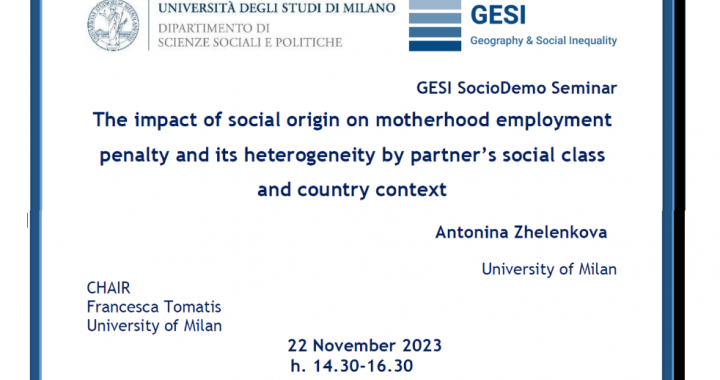We invite you to the next GESI Seminar on Wednesday, 22nd November 2023 at 14:30.
Antonina Zhelenkova (University of Milan) will present her research on
The impact of social origin on the motherhood employment penalty and
its heterogeneity by partner’s social class and country context
Both live and online participation is welcome!
SPS Seminar Room (1st floor, Conservatorio side)
Facoltà di Scienze Politiche, Economiche e Sociali in via Conservatorio n. 7, Milano
MS TEAMS (link: https://urly.it/3y707) ID riunione: 312 495 645 066 Passcode: AmMLec
Chair: Francesca Tomatis (University of Milan)
Abstract: The study is focused on the interplay between the family-of-origin (social class of origin) and the family of-destination (motherhood, partner’s resources) factors in shaping women’s employment outcomes. Although several studies have examined the role of education for women’s employment, there is no evidence on how social origin, net of educational achievement, might impact the labour market outcomes associated with motherhood and how this effect might change depending on partner’s resources and country context. Using SHARELIFE data and random effects models, the study shows that mothers with advantaged social origins have higher chances of being employed compared to mothers with less privileged backgrounds, net of the educational level. This effect is further amplified with the increase of the number of children, whereas the role of the partner’s resources in the interplay with a woman’s social origin is limited. A country comparative analysis shows that the employment disadvantage of mothers from working-class families compared to mothers from middle- or upper-class families is relatively larger in Germany, Austria, and Switzerland, characterized by limited support for female workforce participation, traditional gender role attitudes, as well as highly rigid (Germany, Austria) or highly competitive and segmented (Switzerland) labour markets. At the same time, the differences are less pronounced in Sweden characterized by extensive public support for childcare, open and egalitarian mobility opportunities, as well as in Southern European countries where average female employment rates are the lowest so that the direct effect of social origin makes no difference for motherhood penalties.
